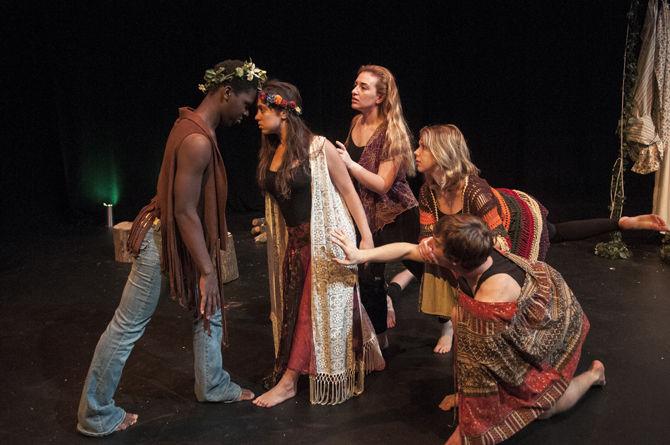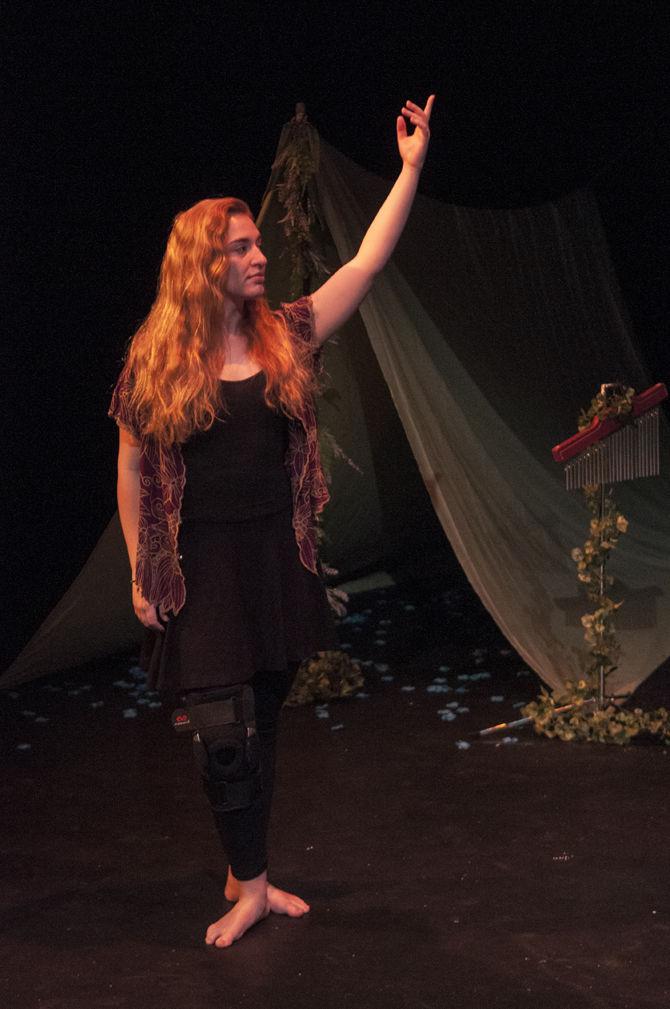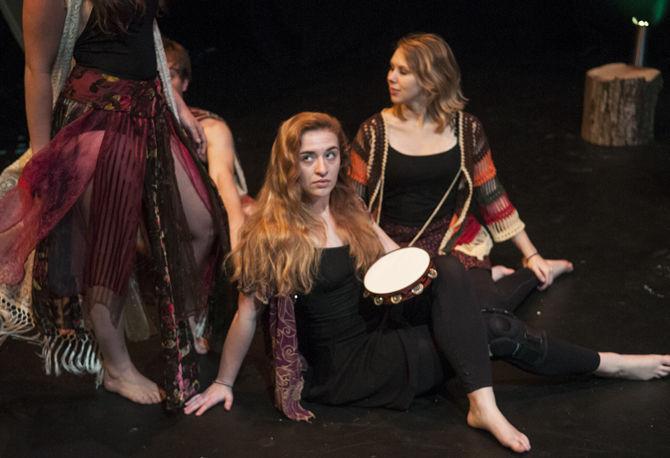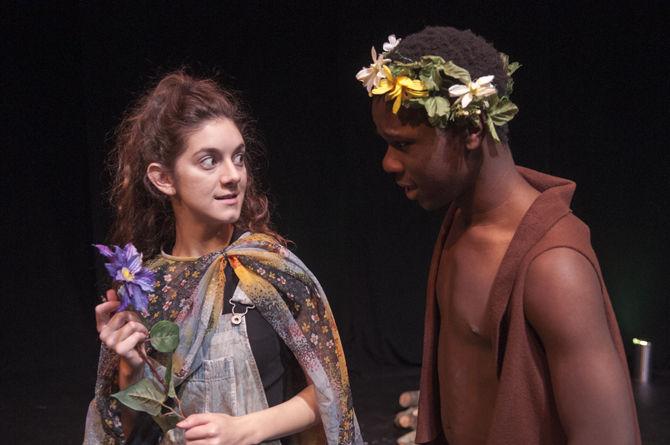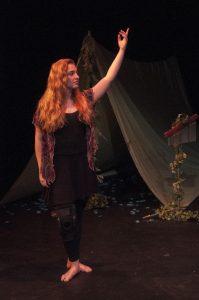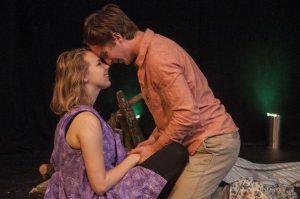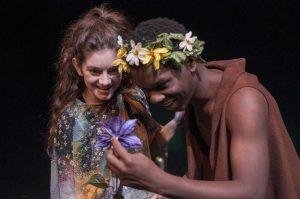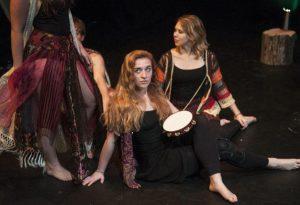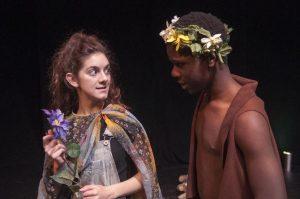Theatre-goers have the opportunity to disappear into the woods this week, to the dreamlike fantasy world of William Shakespeare’s “A Midsummer Night’s Dream.”
The show is premiering March 8 as a production of the LSU Lab Theatre, and is running until March 13 in the Music and Dramatic Arts Building Studio Theatre.
All performances run at 7:30 p.m., with an additional 2 p.m. performance March 13. Tickets are $10.
“Midsummer” is theatre senior Erin Sheets’ second show directing in her undergraduate career.
Sheets said learning Shakespeare is a process that’s never really complete.
“You can spend your entire life studying Shakespeare and never really have a full grasp of it,” she said. “So it’s really important that you start your experience and relationship with Shakespeare as early as humanly possible.”
While rehearsals have been underway for little over a month, pre-production on the show has been in process for a year.
Sheets worked with Mallory Osigian, the show’s dramaturg, to cut the script over the summer. Osigian cut the three hour script down to a 75-minute running time, while maintaining its script’s integrity, with rhyming and iambic pentameter.
The director and the cast recognize the challenges in producing Shakespeare’s work, primarily with the language barrier.
“Clarity becomes really important because we have to realize that our audience won’t be as well-versed in it,” Sheets said.
Sheets said that “Midsummer” is one of Shakespeare’s lighter, more approachable works.
“What we want people to take from it is remembering what it was like to be stupidly in love when you’re young and the ridiculousness of it, but also having an appreciation for the innocence and purity of that,” Sheets said.
Sheets wants to create a lasting impression of Shakespeare on students and change their perspective of the English playwright, as most think of his work as boring and incomprehensible.
“I think the thing about creating a compelling piece of theatre is having something that people can listen to and identify with,” Sheets said.
Theatre sophomore Meg Grey plays Titania, the queen of the fairies and the royalty of the realm.
“She represents a freedom of spirit that a lot of people don’t possess any longer,” Grey said. “She’s a force to be reckoned with, a wild tsunami of power and womanhood.”
Grey has been in Shakespearean productions before and cites the powerful language as a double-edged sword; the dialogue is so strong that it helps to remember it.
“I really think he writes about the epitome of human experience. He knows how to get to the heart of what really matters,” she said.
Grey said acting out Shakespeare is so difficult not only because of memorization and tricky lines, but also because of the connections the actors have to make to survive.
“When he writes, he writes in the rhythm of a heartbeat. That’s what iambic pentameter is,” Grey said. “So his characters are always living, always in the moment, always surviving by what they say.”
Watching the ensemble grow together has been one of the best parts about the production for Grey.
Grey said she hopes to instill a love of Shakespeare within the audience, and for them to be more lenient with themselves. In “Midsummer,” the characters are able to live life to the fullest once they go out into the woods, she said. She wants the audience to have fun with it and “to go out into the magic of the woods every once in awhile,” Grey said.
English and theatre junior Caitlin Brimer plays the infamous Puck, a mischievous fairy who sets most of the plot in motion.
“What’s a misconception is that you can just build your character by yourself,” Brimer said. “When you’re in an ensemble part you have to play off the other people to find the connection and then build your own personality with them.”
Brimer said the cast has been open to trying new things and taking positive suggestions from one another. They’re constantly working together to improve the production and increase the learning experience. Their acting has to be especially expressive to make up for the language disparity.
“More so than learning the language and memorizing it is being able to translate it for the audience,” she said.
Like Grey, Brimer hopes to give attendees a new outlook on Shakespeare’s writing.
“I want them to have fun,” she said. “I think that’s what the show is all about. I want the audience to feel that Shakespeare can be fun and can be understandable and relatable.”
All of the cast plays two or more characters, except for Puck. Carleton wants students to gain something from seeing the play, especially if they’re there as part of a mandatory class assignment.
“I hope people who come here for a class take it as a positive experience,” Carleton said. “That’s our biggest goal because we know our audience and we hope that we can change their mind a little bit about Shakespeare and about
going to see plays in general.”
Carleton elaborated on the relevance of “Midsummer” toUniversity life today.
“Our whole production is set on love, and what’s the difference between love and lust, and that’s a very prominent theme in college life,” Carleton said.
Sheets said that the cast his a mix of experience levels, and that the production has been a learning experience for allinvolved.
“They’ve all worked really well together to educate each other and help each other grow. They’re all so invested and so
involved and they’ve all worked so hard,” Sheets said. “I think that especially going into opening night, we’re going to be in a really good place.”
Shakespeare’s ‘A Midsummer Night’s Dream’ brought to campus through student-directed play
March 7, 2016
Several cast members of “A Midsummer Night’s Dream” rehearse Sunday, March 6, 2016, in the Music and Dramatic Arts building’s Studio Theatre.
More to Discover



